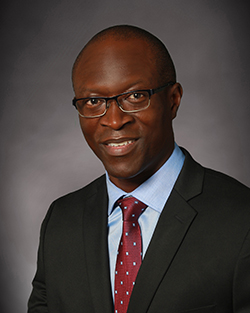Conrad Tucker serves as Atlantic Council Science and Policy Fellow
07/31/17
UNIVERSITY PARK, Pa. — Conrad Tucker, associate professor of engineering design and industrial engineering, is currently serving a four-month term as a Science and Policy Fellow with the Atlantic Council’s Brent Scowcroft Center on International Security’s Foresight, Strategy, and Risks Initiative (FSR).
The FSR works to provide business leaders, policymakers and the general public with information on how to create a better future by identifying current trends, analyzing risks and designing strategies to improve lives. Fellows with FSR use cutting-edge techniques and tools like data analytics, scenario modeling and simulation to engage global experts and decision-makers and general citizens to showcase how today’s decisions impact tomorrow.
“The most pressing challenges facing societies in the 21st century are multidisciplinary in nature and therefore require a systems-thinking approach to solving the. This includes a fundamental understanding of how multiple components of a system function, ranging from how policy decisions are made to how engineering solutions are achieved,” Tucker said.
The initiative focuses on four key areas – the Atlantic Council Strategy Papers Series; Global Risks; Values, Norms, and Governance; and Emerging Technology and Innovation. The goal of the paper series is to aid the strategic thinking of the U.S., its allied nations, the private sector, the nonprofit sector and the media. The Global Risks analytic area analyzes and tracks trends and risks that have a global impact. The Values, Norms, and Governance area focuses on governmental issues such as threats to responsible governance, reforming governments and working with governments to strengthen liberal order. The Emerging Technology and Innovation area evaluates disruptive technologies that will cause the development of strategies that allow continued success through changing times.
Though the Atlantic Council generally has resident and non-resident fellows, Tucker’s Science and Policy Fellow position is the first of its kind. As a Fellow, Tucker explores the impact of big data and machine learning on policy decisions and science, technology, engineering and math advancements.
“The initial focus will be on exploring how information is disseminated on large scale social media networks and how policy decisions can impact the veracity of information and society’s trust in these social media networks,” he said.
He is also investigating how the availability of big data sets may create discrepancies in artificial intelligence advancement.
Tucker spends at least one week per month in Washington, D.C., working with other policy decision-makers and attending Atlantic Council events. The remaining time he spends in State College working on a data visualization platform that captures information in real-time as it is generated and disseminated. Tucker’s hope is that this will help raise public awareness and understanding relating to the flow of information across geographical regions.
Tucker said his engineering background enables him to help develop solutions to issues like big data’s impact on society that allow policymakers to better communicate potentially complex concepts to the general public. Creating this partnership between policy makers and academic leaders and providing correct and effective solutions to problems are crucial components of continued advancement in STEM research and local, national and global governmental policies.
“There is always the opportunity for policy decision-makers and researchers to engage in more meaningful interactions, especially since policy decisions can impact the advancement of research and teaching and vice versa,” Tucker said. “Having the opportunity to engage with policymakers through initiatives such as the Atlantic Council’s Science and Policy Fellowship will hopefully enable researchers to get a better understanding of these intersections.



